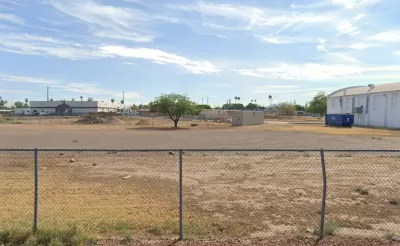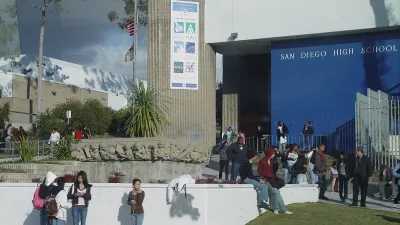Two Phoenix school districts are selling their underused properties to build over 200 units of affordable housing.

You’ve heard of ‘Yes in My Backyard’ and ‘Yes in God’s Backyard.’ How about ‘Yes in My Schoolyard’?
Two Phoenix school districts are partnering with the city to build affordable housing on unused district-owned land. According to an article in The Copper Courier, “The city will serve as an intermediary in these transactions, ensuring the land will be dedicated to affordable housing development through a Land Use Restrictive Agreement (LURA) that mandates affordable housing use for at least 40 years.”
The effort will create 264 housing units in two developments and adhere to federal affordability standards. “The units will be specifically targeted at households earning 80% or less of the area median income.”
The article notes, “The transaction structure complies with Arizona law, which permits school districts to sell property to government entities for public purposes, provided such sales don’t interfere with normal school operations.”
FULL STORY: Phoenix school districts convert unused land into 264 affordable homes

Manufactured Crisis: Losing the Nation’s Largest Source of Unsubsidized Affordable Housing
Manufactured housing communities have long been an affordable housing option for millions of people living in the U.S., but that affordability is disappearing rapidly. How did we get here?

Americans May Be Stuck — But Why?
Americans are moving a lot less than they once did, and that is a problem. While Yoni Applebaum, in his highly-publicized article Stuck, gets the reasons badly wrong, it's still important to ask: why are we moving so much less than before?

Research Shows More Roads = More Driving
A national study shows, once again, that increasing road supply induces additional vehicle travel, particularly over the long run.

Judge Halts Enforcement of Anti-Homeless Laws in Grants Pass
The Oregon city will be barred from enforcing two ordinances that prosecute unhoused residents until it increases capacity and accessibility at designated camping sites.

Advancing Sustainability in Los Angeles County Schools
The Los Angeles County Office of Education’s Green Schools Symposium brings together educators, students, and experts to advance sustainability in schools through innovative design, climate resilience strategies, and collaborative learning.

Using Old Oil and Gas Wells for Green Energy Storage
Penn State researchers have found that repurposing abandoned oil and gas wells for geothermal-assisted compressed-air energy storage can boost efficiency, reduce environmental risks, and support clean energy and job transitions.
Urban Design for Planners 1: Software Tools
This six-course series explores essential urban design concepts using open source software and equips planners with the tools they need to participate fully in the urban design process.
Planning for Universal Design
Learn the tools for implementing Universal Design in planning regulations.
City of Moreno Valley
Institute for Housing and Urban Development Studies (IHS)
City of Grandview
Harvard GSD Executive Education
NYU Wagner Graduate School of Public Service
City of Cambridge, Maryland
Newport County Development Council: Connect Greater Newport





























